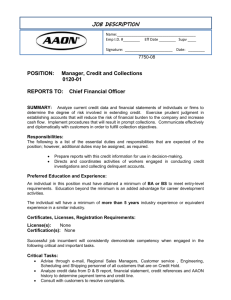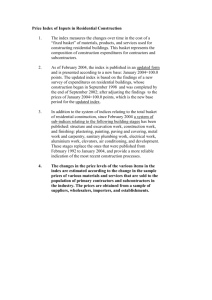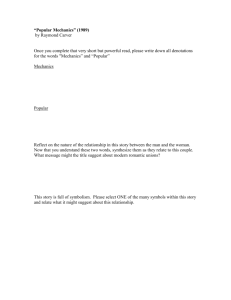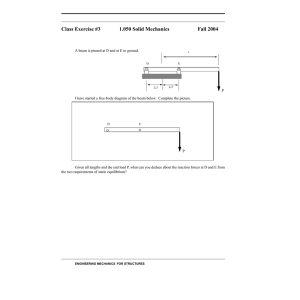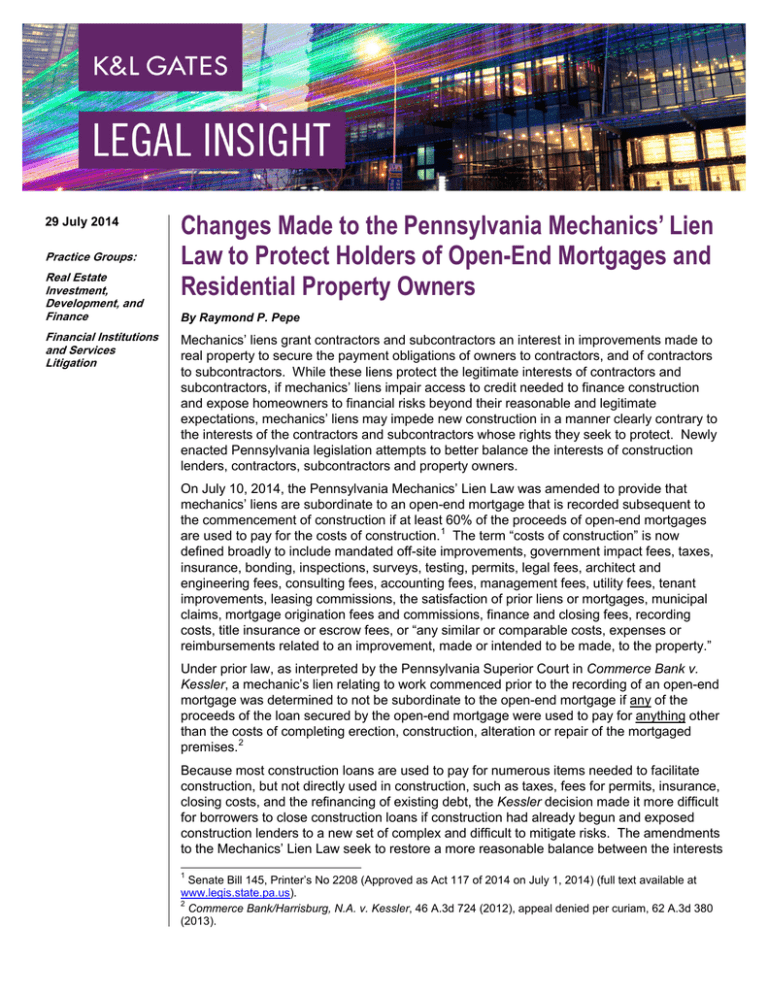
29 July 2014
Practice Groups:
Real Estate
Investment,
Development, and
Finance
Financial Institutions
and Services
Litigation
Changes Made to the Pennsylvania Mechanics’ Lien
Law to Protect Holders of Open-End Mortgages and
Residential Property Owners
By Raymond P. Pepe
Mechanics’ liens grant contractors and subcontractors an interest in improvements made to
real property to secure the payment obligations of owners to contractors, and of contractors
to subcontractors. While these liens protect the legitimate interests of contractors and
subcontractors, if mechanics’ liens impair access to credit needed to finance construction
and expose homeowners to financial risks beyond their reasonable and legitimate
expectations, mechanics’ liens may impede new construction in a manner clearly contrary to
the interests of the contractors and subcontractors whose rights they seek to protect. Newly
enacted Pennsylvania legislation attempts to better balance the interests of construction
lenders, contractors, subcontractors and property owners.
On July 10, 2014, the Pennsylvania Mechanics’ Lien Law was amended to provide that
mechanics’ liens are subordinate to an open-end mortgage that is recorded subsequent to
the commencement of construction if at least 60% of the proceeds of open-end mortgages
are used to pay for the costs of construction. 1 The term “costs of construction” is now
defined broadly to include mandated off-site improvements, government impact fees, taxes,
insurance, bonding, inspections, surveys, testing, permits, legal fees, architect and
engineering fees, consulting fees, accounting fees, management fees, utility fees, tenant
improvements, leasing commissions, the satisfaction of prior liens or mortgages, municipal
claims, mortgage origination fees and commissions, finance and closing fees, recording
costs, title insurance or escrow fees, or “any similar or comparable costs, expenses or
reimbursements related to an improvement, made or intended to be made, to the property.”
Under prior law, as interpreted by the Pennsylvania Superior Court in Commerce Bank v.
Kessler, a mechanic’s lien relating to work commenced prior to the recording of an open-end
mortgage was determined to not be subordinate to the open-end mortgage if any of the
proceeds of the loan secured by the open-end mortgage were used to pay for anything other
than the costs of completing erection, construction, alteration or repair of the mortgaged
premises. 2
Because most construction loans are used to pay for numerous items needed to facilitate
construction, but not directly used in construction, such as taxes, fees for permits, insurance,
closing costs, and the refinancing of existing debt, the Kessler decision made it more difficult
for borrowers to close construction loans if construction had already begun and exposed
construction lenders to a new set of complex and difficult to mitigate risks. The amendments
to the Mechanics’ Lien Law seek to restore a more reasonable balance between the interests
1
Senate Bill 145, Printer’s No 2208 (Approved as Act 117 of 2014 on July 1, 2014) (full text available at
www.legis.state.pa.us).
2
Commerce Bank/Harrisburg, N.A. v. Kessler, 46 A.3d 724 (2012), appeal denied per curiam, 62 A.3d 380
(2013).
Changes Made to the Pennsylvania Mechanics’ Lien Law to Protect Holders of
Open-End Mortgages and Residential Property Owners
of borrowers, lenders, contractors and subcontractors. The expanded open-end mortgage
priorities take effect on September 8, 2014, and apply to liens for work visibly commenced
prior to the effective date that are not perfected until on or after September 8, 2014.
The legislation also amended the Mechanics’ Lien Law to limit the extent to which the
owners of residential property are subject to mechanics’ liens. The legislation provides that a
lien claim filed with respect to a residential property may be discharged when the owner or a
tenant has paid the full contract price to the contractor. If the owner or tenant of a residential
property has paid an amount less than the full contract price, the amendments allow a claim
filed against a residential property to be reduced to the amount of the unpaid contract price.
The legislation also provides that a subcontractor does not have a right to a lien when the
owner or tenant paid the full contract price to the contractor if the property is a one-or two
unit residential property or townhouse intended to be used as a residence of the owner, or
used as the residence of a tenant subsequent to occupation by the owner.
No comparable protections for residential property owners were provided to home owners by
prior law, and instead mechanics’ lien claims were limited to the total amount of the contract
price only if an owner was able to prove that subcontractors asserting claims had actual
knowledge of the total contract price and the time payment was due to the general
contractor, or the pertinent terms of the contract were filed with the county prothonotary prior
to the commencement of construction, or at least 10 days prior to the execution of the
general contract or a contract with a subcontractor. The limits on claims asserted against
residential properties and townhouses take effect on September 8, 2014.
A more extensive analysis of the July 10, 2014 amendments to the Pennsylvania Mechanics
Lien Law as published by the PA Banker’s Association is available here that was also
prepared by the author of this Real Estate Alert.
Author:
Raymond P. Pepe
raymond.pepe@klgates.com
+1.717.231.5988
Anchorage Austin Beijing Berlin Boston Brisbane Brussels Charleston Charlotte Chicago Dallas Doha Dubai Fort Worth Frankfurt
Harrisburg Hong Kong Houston London Los Angeles Melbourne Miami Milan Moscow Newark New York Orange County Palo Alto Paris
Perth Pittsburgh Portland Raleigh Research Triangle Park San Diego San Francisco São Paulo Seattle Seoul Shanghai Singapore Spokane
Sydney Taipei Tokyo Warsaw Washington, D.C. Wilmington
K&L Gates practices out of 48 fully integrated offices located in the United States, Asia, Australia, Europe, the
Middle East and South America and represents leading global corporations, growth and middle-market companies,
capital markets participants and entrepreneurs in every major industry group as well as public sector entities,
educational institutions, philanthropic organizations and individuals. For more information about K&L Gates or its
locations, practices and registrations, visit www.klgates.com.
This publication is for informational purposes and does not contain or convey legal advice. The information herein should not be used or relied upon in
regard to any particular facts or circumstances without first consulting a lawyer.
2
Changes Made to the Pennsylvania Mechanics’ Lien Law to Protect Holders of
Open-End Mortgages and Residential Property Owners
© 2014 K&L Gates LLP. All Rights Reserved.
3

